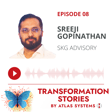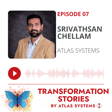Become a Creator today!Start creating today - Share your story with the world!
Start for free
00:00:00
00:00:01

#9: Virender Aggarwal
The opportunities to deploy AI and other advanced systems in today’s businesses are almost unlimited. But how can executives make the right tech choices to drive innovation and profitability for their firms?
Virender Aggarwal (known to nearly everyone as just “VA”) has been consulting with CEOs, CTOs, and others for years to help them make smarter strategic directions in the digital space.
In this latest Atlas Systems podcast, VA offers specific examples of what to do – and not to do – when leveraging GenAI, cloud, and other advanced technologies to drive transformation and business performance.
Recommended
Transcript
Introduction to Transformation and Innovation
00:00:00
Speaker
This is Transformation Stories, a podcast from Atlas Systems, exploring how companies are leaping into the future through deliberate change and innovation. In today's digital landscape, businesses face a choice to transform or risk falling behind. Here are the insights of visionaries and changemakers were driving transformation across various industries and roles. They'll share their experiences, strategies, and the most potent opportunities for success.
Expert Insights from Verender Ackerwall
00:00:31
Speaker
Join us as we uncover the secrets of transformation.
00:00:37
Speaker
Verender Ackerwall, also known as VA, is a tech industry veteran with over 40 years of experience in leading large sales organizations, driving transformational consulting, and acting as a catalyst for disruptive change. He has consistently anticipated future tech trends and positioned organizations ahead of the curve, ready to embrace the next wave of innovation. With a deep understanding of modern technology architectures,
00:01:04
Speaker
Agarwal excels in cloud-native and serverless technologies. His extensive knowledge spans across areas such as databases, front-end trends, AI, ML, data lakes, and multi-cloud ecosystems. A key strength is his ability to engage with C-suite executives, including CEOs and CTOs, and senior stakeholders, providing strategic insights into leveraging SaaS products and generative AI solutions.
Exploring Agentic and Generative AI
00:01:34
Speaker
His recent focus has been on agentic AI, where he's involved in pushing the boundaries of artificial intelligence applications. All right, great. Well, VA, it's great to welcome you to Transformation Stories. Thanks for speaking to us today. Most welcome, Dave. Yeah. And our topic today is Gen AI and use cases, how companies can use it, how they're using it, and opportunities for the future.
00:01:59
Speaker
So I wonder if you could talk a little about, I know you're involved with a lot of different companies, um how you see companies using GenAI effectively. I think Genii's corporate use is still in its infancy. People are discovering use cases and it's beginning to pick up pace now. And the fact that it does not always generate correct answers and sometimes hallucinates gives people cause for trouble and companies worry a little about their data are going to the cloud.
00:02:32
Speaker
But now we have more and more open source models which you can download on your systems where you can recite. We are beginning to see more and more use cases coming and some of the largest corporations throwing their weight behind Genii and what more specifically the new avatar of Genii meant for more corporate is agentic AI which I will describe a little in the detail like Salesforce launched Agent Force recently, which has autonomous agents helping with various tasks right now. Similarly, there are a bunch of companies mushroving now in the Agent Take AI space and putting everybody is falling over each other, like ServiceNow and others are un announcing their own plans for Agent Take AI.
Current Applications and Challenges of AI
00:03:22
Speaker
So I think it is right for widespread adoption.
00:03:27
Speaker
It will take time because legislation and other issues can slow it down. And the elements keep improving as time goes by. So we should see much higher adoption going forward and corporates as well. And in terms of some of sort of the lowest hanging fruit, I mean, what do you see as the problems that Gen AI can really solve right off the bat very quickly for companies, general types of problems?
00:03:53
Speaker
So the lowest hanging fruits will be customer support, answering travel tickets, automatically responding to them. and A lot in terms of call central operations, prompting the person responding to a query with real time data to assist them, answer the questions so that somebody might be posing. So with 30 seconds delay, you can pretty much show every piece of information that Like say somebody calls to say why my telephone bill is high. So you can give answers to that very specifically because the system will throw up the data. sort of Otherwise you tend to get back or title something into the computer and try and get that answer for that subscriber and so on. so
00:04:40
Speaker
So customer support is the most obvious use case called central operations or some automat automated calling as well that may take place that is a most the lowest of low hanging tools that I would say. Second is searching your corporate database for all the information that your company has and being able to answer questions that people may have like your sales team We have hundreds of presentations of various areas so they can simply ask questions about what's our capability in the area of cyber security, it will answer what are the use cases we have of this particular ah product or an offering in the market, customer case studies it can bring that up. So it can pretty much like charge if it pulls out and information from any corner of the world.
00:05:25
Speaker
It will be able to pull out information from your corporate database. These are the lowest of low hanging that I would say um that companies can deploy at scale right now. And real-time translation, somebody speaking Spanish, you are hearing English, you are speaking English, somebody, the other person is hearing Spanish, so the language barrier.
00:05:45
Speaker
barriers that are getting broken, the automatic translation is taking place, scanning of handwritten documents to printed documents, some invoice has come as a PDF, it will be able to put it into the database. So there's a lot of manual work that was there and be then I would say that It's all beginning to come together.
Ethical Considerations in AI Deployment
00:06:07
Speaker
There is still a wide scope of adoption across the businesses, but yes, there is indeed, ah I can see the acceleration speed up more dramatically. And just in terms of taking advantage of these really
00:06:28
Speaker
immediate opportunities. what What challenges are companies facing? like What hurdles do they have to do they have to get over still to to really take advantage of just that simplest and simplest capability?
00:06:41
Speaker
ah So the thing is it can see what technology is involved is you have to use the RAG, R-A-G or internal data vector databases and to get accurate answers out of them is a trick is a not a trick it is fair bit of science and that both involve me to try with various things. So it is not always giving the right answer.
00:07:07
Speaker
It is not always giving what you expect of it. So you have to train the model, reduce error rates and reduce hallucinations and reduce some obvious mistakes that may take place. So if you see the recent introduction of chat DPD 4.0 which thinks and gives the answer, which needs to answer a lot more slower than um what the other elements were giving. So it is thinking now and it's trying to eliminate, it's beginning to reason out like a human being but more than sort of a spewing an answer and also and validating against some other reasoning ah to make sure it is it is not hallucinating and not gone off the track completely.
00:07:53
Speaker
So those products are beginning, those offerings are beginning to appear in the market as we move towards, you know, what is called AGI, human-like intelligence that is there. So so I would say companies have no option not to try it because we will lose to your compet competitors.
00:08:14
Speaker
Having said that, there are obvious deficiencies, obvious problems that need to be surmounted and that's what the entire industry is working on in terms of helping eliminate those problems. What is called the ethical guardrails so that you are not using profane language and and stuff like that. The biases are not creeping in.
00:08:39
Speaker
That's it, class. So there is enough and i found more out there. So you run, ah you still of i don't give an answer. You run a check for various ethical guardrails and so on and so forth. So I guess it's a journey, but it's a journey people can't afford to not start taking. What sorts of expertise or you know knowledge or even resources do you think companies need to bring in to really maximize that potential? To me, you know the good thing is that it is no longer you need a PhD. No longer you need a data scientist. ah A lot of common sense of what you need and capability of using those tools and products is pretty much enough. And if you're going to use RAG and vector databases, then there is some bit more knowledge you need or technical technical knowledge you would need.
00:09:39
Speaker
but pretty much ah is somewhat moving towards a stage where end-user will be able to get their job um without needing a specialist computer trained person or a specialist only data science specialist and so on. So in some sense it's learning a lot all by itself and all the responses that we are providing to it and it's becoming wiser by
AI Adoption and Cultural Shifts in Companies
00:10:06
Speaker
the day. So humans are um making it wiser and thereby I think it's able to do a lot more because I would see that coding is pretty much done by the system. So programming is pretty much done by
00:10:23
Speaker
the elements nowadays. And I think more and more walks of life with me, it will keep coming. Like videos, it generates, based on the statement you're giving me, it generates. And so also, I guess it's improving with every passing day. But ah when there are there are issues, you can't blindly put them. You can't say, I'm going to just base it on that and still not see it myself. So there's a human involved here, at least for now.
00:10:54
Speaker
Do you think that there are a lot of off the shelf solutions that people, companies can just grab and start using and making a difference? Or do you think they really have to to work on customizing them to make them really useful?
00:11:06
Speaker
So off the shelf is something that is, first is I mean just to as an example that Tesla's fully automated normal driving is a prime example of fully usable product that you have in the market. So the FSD12.2 or the FSD12.4 or whatever they brought is pretty sophisticated and similarly game always bringing. So all these are symbols of what as a closing or even lot of stuff as a consumer we are already using like automatic email completion automatic response it suggests and so also as a consumer we are being
00:11:40
Speaker
But as a corporation, yes, so now with Salesforce being agent force, you can use its agents straight away. You don't need to, that is off the shelf available now. Similarly, service loss broaden and everybody else is also bringing in the agents. Microsoft has just released on GitHub its library for programming with the autonomous agents.
00:12:08
Speaker
ah Similarly, other entities, Clue.ai and others have also released their EI, agent programming agents. Agents can interact with each other and finish a job end-to-end, ah no passing on the job to the next agent and next agent and so on and so forth, collaborate with each other and finish the job. So I think those products are bringing into common.
00:12:32
Speaker
I would say Salesforce is the one that has raised the bar for everybody. and If you think about you know sort of going beyond the low-hanging fruit, you know what is but are sort of the big visions of how Gen. AI can make a ah really huge difference in the future you know as things continue to evolve?
00:12:52
Speaker
Yeah, I think apart from the low iron-green fruit, companies should attempt at various processes in which they can reduce 90% of the process, not eliminate the process completely. ah So huge amount of efficiencies can come in in various processes, let's say in voice processing, in voice matching, matching with the PEO.
00:13:17
Speaker
All that can become automatic scanning the invoice, PDF attachment, ah and making sense of it, automatically making sense. What's a PO number? What's a PO date? What is the quantity? What's the item number? Just make sense of it using element intelligence and not necessarily traditional way of saying that in this particular case, you find PO number, PO rate, and so on. So the typical OCR, ICR requires you specify and look for this location. And every vendor has a different format of invoice. So it's a failure troublesome task. So that is something that companies can start attempting to automate. Customer support is something they should go all in to automate.
00:14:01
Speaker
The system can resolve a huge number of customer me queries and so on. I just finished one of the items whereby I was canceling my Gemini subscription, paid subscription and the whole process was handled by the chatbot. So occasionally, so presently, I was done in 30 seconds and without having to any trouble at all, just my mail ID was enough for them to no authentication, nothing. I just logged in and that's it. It got done.
00:14:29
Speaker
so So the whole being able to carry a task so seamlessly as I experienced with Google just now ah is something that can be done. And let's say if you want to log on to your banking app and ask a question from the chatbot there, how can I get the fee waiver of my credit card or late fee waiver. I'm sure it won't answer any matter that you can actually get it done. But if you were to go to a plexity.io or chat decree and ask a question, i ah i i I have a card from this particular bank and how do I get a fee waiver for late fee waiver or annual fee waiver. And I'm and just telling a personal experience it.
00:15:17
Speaker
It tore me far better than the banking on what it did to me. I went and did the steps and pretty much I got the fee we were then. So what I'm trying to say is that they are learning from every action of every citizen and globally and becoming much much smarter and the companies obviously they need to provide in their own application at least same degree of intelligence what an outside board is giving did not work. So I think much more intelligent chatbots, much more intelligent voice bots, voice is appealing in which lot of progress has been made. and um So when people are sitting in a conference room and chatting, it can automatically based on the voice, ah figure out whos who said what and so on.
00:16:02
Speaker
So all that automatically take notes to a person and so on. I very often refer my legal documents. I attach the legal documents and ask, tell me, how can you safeguard me against this, this, this, this, this, and that we change the clause like this to this and so on and so forth. It comes a lot of recommendation.
00:16:20
Speaker
So I guess the usage are infinite and then there are specialized elements like medical elements which are far better at cancer detection and almost reaching the expertise of the the best radiologist that we have and so so usage as spanning across a variety of areas, legal LLMs, research LLMs. If you're given a topic to research, it will do like a person that you would take too much research, it will fetch you the data in no time. So, so pretty much, you know, a lot of usage for companies, especially consulting companies.
00:17:04
Speaker
want to be able to draw a lot of data out of it. And manufacturing companies, the robotics that are self-learning robots, that may be an area that will come into the future. But right now, I think the main main area is the white-collar workforce that is being addressed by this ambulance at the moment. And that's where I see a lot of high activity.
00:17:25
Speaker
And what do you think the companies need to do now in terms of how they're constructed internally, how they work, how they approach Gen AI to set themselves up for success three years from now, five years from now, to make sure that they're really tapping into the value? I think difficult question. I think the companies need to open up everybody's mind to the possibilities and encourage people to use these technologies because if you don't use your company, it will be used. I'm sure there is a fear of job losses. The fact is your company would won't stop using it. so So I guess companies need to embrace it and ultimately it has to be driven from the top
00:18:19
Speaker
um The top has to be convinced that that's where the world is a really allowing me to take my company there. So then fortunately for us, the level of knowledge required is reducing did the job run. You don't need to say I need to have 10 data science PhDs. That's no longer required. In fact, they may have just but slow it down and not increase the pace.
00:18:42
Speaker
so So somebody, small business knowledge person can get possibly more out of it than a technical knowledge person. So a person with business requirement can can get the job done because they know the process, they know what they want and and so on. And technology part of it is beginning to go away as more and more of the product offers you front end, UI and prompt you to get things done and pretty much do most of it themselves based on what you want to get done. So I think we are beginning to go there. So companies have to really open up their mind and it can start with engaging somebody who can identify the low-hanging use cases for the company and the try it out. The first thing will be the moment next of us mistake you want to throw it out, that's a mistake.
00:19:35
Speaker
So you have to patiently, like a child, let it learn and grow with you and not at the first mistake to assume this is bullshit. So that is that is something that I would say companies need to do. and and And companies who are going to make the mark are beginning to do that yet. What is your own experience in learning about Gen AI and working with Gen AI? What does that tell you about the technology So I'm scared ah you know what will I do ah in future because it pretty much does a lot of stuff that I do right now. but So if I'm scared, I guess everybody else who's not involved will we and should be even more scared. But I i guess I'm going to involve advanced users of this.
00:20:26
Speaker
i be I've been using with Ag and Victor today. This is for a while now and we are experimenting with various variations of ah this. We are getting a lot of programs and then we have started writing agents now for agentic AI using the Microsoft framework. So I say we are at the forefront, but the capabilities of this scares everybody, scares me a lot. yeah So I guess I'm at a point of my life be I don't worry about being unemployed, but I guess people younger people might worry about what will happen to their carriers.
The Future and Sustainability of AI
00:21:03
Speaker
So, but I think embracing is the only choice. eat You can't, you can't rely on it. That's what I will say. But I found it phenomenal productivity enhancement tool. In fact, perplexity, I owe perpetually open. Even if I have to get a restaurant phone number, I ask it. I no longer use Google search. but
00:21:23
Speaker
What time does a flight take off from this to this place? I just type in Pakistan. It's totally ah and advertisement free. It gives me the precise answer. When I ask a follow-up question, it fully understands what I was asking. or and So I would say that for me, it's a phenomenal opportunity to ask.
00:21:46
Speaker
come to us and yourself Do you have any final words on GenAI, where it's going, where the possibilities are, what companies should do next? Yeah, I think it's all it's going to be all pervasive. I mean, it will possibly lead to huge global warming because it consumes so much energy that no amount of meat will go back to nuclear energy. There's no choice. oh And I think motor scarcity is another thing that we will face. But ah it's not, there's genies out of the bottle. It can't be put back.
00:22:23
Speaker
So as a company, as a consumer, I have to embrace and move on with it. And I think at some stage, ah what we are enjoying for free, ah all this tragedy and Google dreaming and perplexity and others, um they'll have to start charging money someday.
00:22:44
Speaker
Because there's a huge amount of CPU capacity, GPU capacity, power consumption, everything else taking place. And so my feeling is it's near there with us. It's not going to go away. And we better embrace it and move on and see where it takes us. Well, thank you so much for really great talking to you about GenAI and Appreciate your insights. mo felttan bit pleasure and that's a wrap on today's episode of transformation stories you found this episode as enlightening as we did be sure to subscribe rate and leave review your feedback fuels our mission to bring you more thought provoking conversations As we conclude today's journey, remember that transformation is within reach for every business, and it starts with deliberate choices. Keep pushing boundaries, seeking new opportunities, and embracing change. Until next time, this is Transformation Stories.







